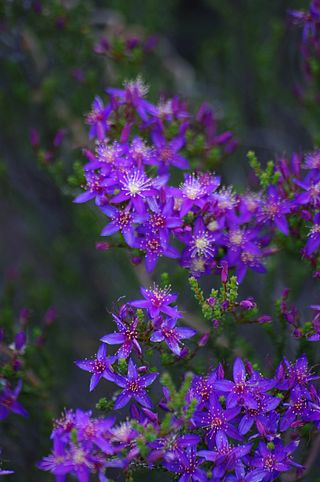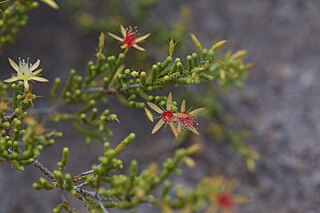
Calytrix depressa is a species of flowering plant in the myrtle family Myrtaceae and is endemic to the south-west of Western Australia. It is a glabrous shrub with linear to lance-shaped leaves and mauve to violet or yellow flowers with 35 to 75 stamens in several rows.

Calytrix leschenaultii is a species of flowering plant in the myrtle family Myrtaceae and is endemic to the Southwest Australia of Western Australia. It is a mostly glabrous shrub with egg-shaped, elliptic, lance-shaped or linear leaves and purple, mauve, violet or pink flowers with a white or yellow base, and 6 to 40 white or yellowish stamens.
Calytrix amethystina is a species of flowering plant in the myrtle family Myrtaceae and is endemic to inland areas of Western Australia. It is a glabrous shrub with egg-shaped to oblong or more or less round leaves and clusters of purple to violet flowers with about 35 to 80 white stamens in several rows.

Calytrix carinata is a species of flowering plant in the myrtle family Myrtaceae and is endemic to northern Australia. It is a more or less glabrous shrub with egg-shaped, elliptic, linear or lanceolate leaves and clusters of pink, pinkish purple, or reddish flowers with about 30 to 50 pink and yellowish white stamens in two rows.

Calytrix chrysantha is a species of flowering plant in the myrtle family Myrtaceae and is endemic to the south-west of Western Australia. It is a glabrous shrub usually with oblong to linear leaves and clusters of yellow flowers with about 45 to 55 yellow stamens in several rows.

Calytrix desolata is a species of flowering plant in the myrtle family Myrtaceae and is endemic to the western regions of Western Australia. It is a glabrous shrub with linear oblong or lance-shaped leaves with the narrower end towards the base, and pink to purple flowers with about 30 to 60 stamens in several rows.

Calytrix duplistipulata is a species of flowering plant in the myrtle family Myrtaceae and is endemic to inland areas of Western Australia. It is a glabrous shrub with elliptic to egg-shaped or oblong leaves, and pink to purple flowers with about 9 to 16 stamens in a single row.
Calytrix eneabbensis is a species of flowering plant in the myrtle family Myrtaceae and is endemic to the south-west of Western Australia. It is a glabrous shrub with lance-shaped leaves and purple and yellowish flowers with 40 to 60 stamens in several rows.
Calytrix erosipetala is a species of flowering plant in the myrtle family Myrtaceae and is endemic to inland areas of Western Australia. It is a glabrous shrub with spreading lance-shaped to egg-shaped or linear leaves, and white to pink flowers with about 18 to 24 stamens in a single row.

Calytrix glutinosa is a species of flowering plant in the myrtle family Myrtaceae and is endemic to the south-west of Western Australia. It is a more or less glabrous shrub with linear leaves and clusters of pink to mauve flowers with about 10 to 20 white stamens in one or two rows, becoming reddish-purple as they age.
Calytrix harvestiana is a species of flowering plant in the myrtle family Myrtaceae and is endemic to the west of Western Australia. It is a glabrous shrub with linear, elliptic or egg-shaped leaves and purplish mauve to purple or violet flowers with about 60 to 70 pale yellow stamens in multiple rows.
Calytrix merralliana is a species of flowering plant in the myrtle family Myrtaceae and is endemic to inland areas of Western Australia. It is a glabrous shrub with linear to elliptic leaves and violet flowers with about 45 to 55 yellow stamens in several rows.

Calytrix decussata is a species of flowering plant in the myrtle family Myrtaceae and is endemic to the Northern Territory. It is a shrub with linear to lance-shaped leaves and pinkish-mauve flowers arranged singly or in scatter groups with about 45 to 50 white stamens that become reddish-purple as the flower ages.

Calytrix faucicola is a species of flowering plant in the myrtle family Myrtaceae and is endemic to the Northern Territory of Australia. It is a mostly glabrous shrub with spreading egg-shaped or linear leaves, and pale yellow flowers with about 35 to 45 stamens in several rows.

Calytrix gurulmundensis is a species of flowering plant in the myrtle family Myrtaceae and is endemic to Queensland. It is a mostly glabrous shrub with linear to narrowly elliptic leaves, and cream-coloured flowers with a yellow base, and about 60 to 70 yellow stamens in several rows.
Calytrix islensis is a species of flowering plant in the myrtle family Myrtaceae and is endemic to a restricted area of Queensland. It is a mostly glabrous shrub with elliptic to egg-shaped leaves with the narrower end towards the base, white flowers with a yellow base, and about 65 to 70 yellow stamens in several rows.

Calytrix leptophylla is a species of flowering plant in the myrtle family Myrtaceae and is endemic to Queensland. It is a glabrous shrub with linear leaves, and pink to light purple flowers with a white base, and about 35 to 40 white to yellow stamens in several rows.
Calytrix megaphylla is a species of flowering plant in the myrtle family Myrtaceae and is endemic to the Northern Territory. It is a shrub with linear to narrowly elliptic leaves and pink to pinkish mauve or reddish purple flowers with a paler base, and with about 20 to 50 pink stamens in several rows.
Calytrix micrairoides is a species of flowering plant in the myrtle family Myrtaceae and is endemic to the Northern Territory. It is a prostrate shrub with linear leaves, pink flowers with a paler base, and about 40 to 45 white stamens in several rows.
Calytrix mimiana is a species of flowering plant in the myrtle family Myrtaceae and is endemic to the Northern Territory. It is a glabrous shrub with linear to narrowly lance-shaped leaves with the narrower end towards the base, deep pink to pinkish-mauve flowers, and about 35 to 40 white stamens in several rows, that turn pinkish as they age.











